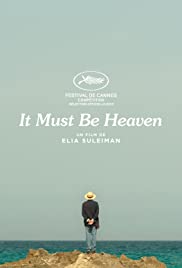
IT MUST BE HEAVEN
Palestine, 2019, 102 minutes, Colour.
Elia Suleiman, Gregoire Colin, Gael Garcia Bernal, Stephen Mc Hattie.
Directed by Elia Suleiman.
It must be Heaven. Not quite. And the question also arises: can there be peace on earth?
Those who know the films of writer-director, performer, Elia Suleiman, know that he is an expert at a particular kind of comedy, partly deadpan, partly satire and parody, partly gentle about human nature. But, all the time, he is also making political point.
He directed documentaries in the 1990s, especially about Palestine. He himself is a Palestinian who comes from Nazareth. Into the 21st-century and he made a number of comedies (which are worth recommending to those who might be coming to his work via this film; in 2002 there was Divine Intervention, in 2009, The Time that Remains).
Practically everyone makes the comparison with the French comedies of CJacques Tati, especially his character, Monsieur Hulot. Tati, early in his career, tall and gaunt. Elia Suleiman is rather shorter, a touch more rotund, distinctive with rather shabbier clothes, always a coat, always a hat. He is in middle-age. He is bearded, bespectacled. He barely says a word throughout the whole film. Tati was a master of mine in the eccentricities of ordinary situations. So too, Suleiman in his character ES, with his hands always behind his back, like Tati. But he generally stands, sits, observes. He can be described as enigmatic, quizzical, a spectator curious about the human race.
He sets a tone at the beginning with a religious ceremony, robed Christian clergy, the faithful, many of them very young, a cross and a symbolic knocking at the door of the tomb – but the man behind the door is refusing to open, the celebrant taking off his crown, going behind the scenes, sounds of a fight, the door opening and the faithful invited in. We are not (never) sure what it means but it does set the comic tone.
The first part of the film is quiet, ES in his native Nazareth, alone in his apartment, wandering the streets, sitting in cafes, visiting his wife’s grave, exploring the countryside. Then he flies to Paris – nervously looking out the window at what seems to be a shuddering wing. However, he becomes a tourist in Paris, the audience wandering and observing with him, the monuments, the sites, a menacing stranger staring at him in the metro, beggars in the street served food by workers driving an ambulance, nuns serving at an outdoor soup kitchen, a priest standing smoking and observing, all kinds of detail. However, there is a purpose in visiting Paris, to raise money for a film about Palestine, with a lot of discussion about how such a film could be made, how polemic it should be, how political – or rather should it be simply showing a character like ES visiting France and the US.
Because the US is his next destination, similar kinds of tourism and observing, an encounter with Gael Garcia Bernal as he goes to discuss production finance in New York City – and failing again. This time there are more explicit references to Palestine, a strong rally of exiled Palestinians, a conference and his sitting on a panel.
One commentator remarked that It must be Heaven is comedy of the absurd. It is. However, the commentator added “absolute nonsense – but in a good sense�.
1. The films of Elia Suleiman? Palestinian? Palestinian background? Israel? Political perspectives? Comic perspectives? Humour, satire, political point?
2. The initial part of the film in Palestine? Nazareth? The streets, homes, shops? The surrounding countryside? The cemetery? The fields? The transition to Paris, the well-known landmarks? The streets, cafes, hotels, film production offices? The transition to New York City? The city, the meetings, hotels, film offices? The range of the musical score? Local songs?
3. The title? Aspects of paradise? The reality of Earth? Desires for peace on earth?
4. The filmmaker and his writing, production, directing? His performance? His style, memories of Jacques Tutty and Mr Malone? Really speaking? Standing, observing? His age, clothes, beard, hat? Observing and enquiring? The style of the comedy, small incidents, characters, exaggerations, pratfalls? The touches of parody?
5. The prologue, the Christians, the ritual ceremony, the clergy in robes, the young faithful, the ceremony of the opening of the door, the refusal, the reaction of the Bishop, going behind the door, the violence, the door opening and everybody invited to worship? Setting a tone to the film?
6. The experience of Nazareth, for the film go out, impressions of the city? As a Palestinian city? As an Israeli city? The details of life? The experience of Paris, the jokes on the plane and the directors fear, landing in Paris, tourist views and jokes, the comparison between Paris and Nazareth? The contrast with New York City? The Palestinian exiles in their meeting? The conferences and the panels?
7. The comment on the situation in Palestine, between Israel and Palestine, by looking at life in France and in the United States?
8. The background of filmmaking, raising finance? The expectations of the French producers? The interviews, the nature of comedy, the nature of politics? Rejection? The discussion of what the present film was doing? The transition to the United States, the intervention of Gael Garcia banal? The ironic comments about films about Mexico and the conquistadors in English?
9. The range of supporting characters? Characters in Nazareth, flight attendants, in restaurants, the poor in the street, the nuns and the soup kitchen, the smoking priest and his
standing by? Busy New York City, airports, guards, restaurants? Gangs – and the humour of gangs of youths suddenly appearing in the streets and the reaction of the director?
10. The ultimate impact of the film? In terms of comedy and enjoyment? In terms of message? With relation to Palestine and the directors continued interest over his career?